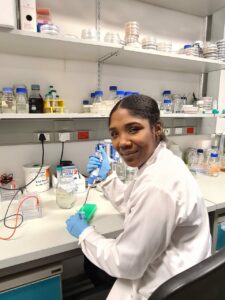
Eden Keyster was part of the UWC/CoE-FS September 2022 graduate cohort. Photo Supplied.
University of the Western Cape (UWC) graduate Eden Keyster had no idea that biotechnology would be her passion before she finished matric in 2015 at Bellville High School and began her undergraduate degree. Like many people interested in science, she thought she wanted to become a doctor.
“But times changed,” she explained.
“And I was introduced to more aspects of biological science as things progressed during my upbringing and my undergraduate years and I got more exposure to agriculture, which I really liked. That’s why I ultimately decided to specialise in plant science.”
That decision has seen the MSc Biotechnology graduate progress with some remarkable work in the realm of food security — a vital discipline in a world where profound change is inevitable.
“We are aware that climate change is going to have a huge impact — we are experiencing that already, and we are living through it. I think it’s important for people to understand how we can ensure that we have food for the future.
“Food security is so important. When people hear that I do plant science they immediately think of genetically modified organisms but that’s not what it’s about; it’s more about what’s important in terms of adapting to the environment rather than changing it.”
Breeding resilience
Keyster completed her master’s in 2021, under the supervision of CoE-FS principal investigator Professor Ndiko Ludidi and co-supervisor, CoE-FS project lead, Professor Marshall Keyster, and with support from the DSI-NRF Centre of Excellence in Food Security (CoE-FS). Her research was all about evaluating the potential of bacterial endophytes and the improvement of saline tolerance in alfalfa, which is a legume found within semi-arid regions in Africa and is used in our livestock feed. She explains the reason that the research was so important is that “we have found that alfalfa has certain mechanisms that make it capable of surviving in abiotic conditions such as drought and salinity”.
“Some of these cultivars are capable of surviving under different salinity concentrations. I was trying to understand which cultivars are the most tolerant and sensitive. Once I had that knowledge, the bacterial endophytes were applied. I was studying to see if the endophytes I extracted from another host plant have the potential to alleviate salinity stress within the different cultivars of alfalfa.”
Food security is more than just produce and supply. It’s about ensuring that everyone has access to healthy nutritious food. Many believe that organic farming is a better approach as we ensure that we are eating fresh and healthy food.
“But you have to think broadly, and answer questions like, ‘Is it going to be as nutritious?’, or ‘Will there be enough to acquire and distribute?’, especially under continuously changing environments.
“The biotech approach that I have learned takes all of that into consideration and tries to ensure that we are not changing the nutritional quality of the food, but rather sustaining it,” said Keyster.
CoE-FS’s vital support
The support that she received from the CoE-FS was fundamental to what she was trying to achieve.
“They started funding me in honours (2020), which took away so much financial stress and it made my life so much easier. I am one of three children, and we are all studying. This support alleviated the financial strain on me, and my parents, otherwise balancing life and work would have been so much harder.”
Unfortunately, her degree took place against the backdrop of the COVID-19 pandemic, when it was at its peak.
“There was not that much subject expertise available at the time because of COVID-19, so a lot of resources were cut off,” she recalled.
Community engagement
Despite the odds, Keyster completed her master’s in only one year. Now, her focus has turned to her PhD, where she is focusing on indigenous crops of Africa. She is also tutoring younger students, as well as practically demonstrating.
“What I tell my second years is that an undergraduate degree teaches you the basics, but as soon as you start a postgrad, you need to be very clear about what it is you are doing and why are you doing it.
“You need to have that same type of determination that you started with. As time progresses, I see a lot of people losing faith in what they are doing. They don’t see the importance of what they do anymore and they lose hope. You have to remember why you are doing what you are doing because that is what carries you through.”
Beyond the tutoring, she is working hard to make her mark wherever she can.
“I learned skills at UWC that I can use in my community-based work so that I am able to educate people in practical ways,” she said.
“Science is more than just the laboratory; it’s all about what you can apply outside in all aspects of life [and] so I’m striving to find that balance”.
Having grown up in the communities around Cape Town, Keyster understands the challenges that people face when trying to eat well.
“Most households struggle with basic economic issues, and we all know that, unfortunately, healthy food is the most expensive food. It’s not supposed to be that way.”
“As part of my work, I try to vouch for home-based gardening and foods that people can grow themselves, that way they are responsible for how their food is grown and produced”.
related Articles
New sorghum study crucial for addressing climate-related challenges
Dr Ali Elnaeim Elbasheir Ali (left) and Prof Ndiko Ludidi (right) are co-authors of a new study on sorghum,…
Proteomic dataset of sorghum leaf and root responses to single and combined...
Researchers from and affiliated with the DSTI-NRF Centre of Excellence in Food Security (CoE-FS) have published a new study on…
‘CoE-FS support opened doors for future opportunities’
Thato Mokgalagadi, a student currently doing her MSocSci Development Studies degree at CoE-FS co-host institution, the University of Pretoria. Photo:…



